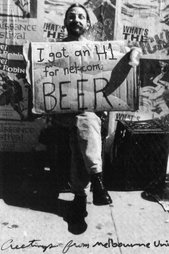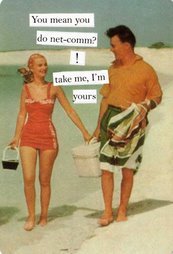
"Cool is a non-politics or anti-politics of information; It is a bad attitude...The proscriptive ellipsis may be taken to be the elementary rhetoric of information cool...the rhetoric of unproducible knowledge that can never be known and shown simultaneously" (Lui, 2006: 177)
1.1 WHAT DOES COOL DO
Like a revolutionary walking away from a successfully staged coup, information cool undermines the system that oppresses it, critiques it with parodies foregrounding its fallibility. But do net artists really offer tangible alternatives? Do Jodi's alternative browsers that 'liberate users from the imperialism of the web' replace the existing with a better alternative? You decide...First, Click on this link which takes you to one of the jodi home pages. By pressing the 'back' navigate button you are taken here. The user is presented with "disorientation, ideological failure, and a rupturing of the law" which, White goes on to note, unevenly distributes confusion and anxiety between spectators depending on their tech-savvyness (White, 2006: 100).

"Spectators who are not familiar with net.art will have problems finding, viewing, and understanding the work. Net.art provides politics for initiated spectators (White, 2006: 100) But as White goes on to argue, by over-use of this technique net.artists like Jodi have desensitized spectators to their 'politics of failure' to the extent that such distortion of code is a conventional web strategy. Stylistically there is a finite number of ways net.artists can critique the web's representation of reality by making it spit noise out onto the users screen, a user who is hardly going to marvel let alone mull over the subtleties of the noise produced. Repetition of these ruptures "causes apathy rather than concern after any lengthy engagement" (White, 2006: 112)
Net.art can become too didactic in its critique, abandoning practicality for the sake of a more edgy, more jammed, more subversive critique. The aim appears not to suggest a better alternative but merely that the existing structure is not 'reality', enforcing Lui's contention that net.art's critique is about destruction more so than it is creation, "In the age of corporate 'creativity and lifelong learning' the romantic premise that critique goes hand in hand with 'renovation', 'innovation', 'originality', is now dysfunctional as an overarching aesthetic." (Lui, 2006: 325) Lui's suggestion here is that destruction is net.art's only hope of achieving critique which transcends the subject from behind enemy lines - the information cool techno intelligentsia beaten into submission now best served by critiquing with a view to undermining rather than overthrowing.
Net.art can become too didactic in its critique, abandoning practicality for the sake of a more edgy, more jammed, more subversive critique. The aim appears not to suggest a better alternative but merely that the existing structure is not 'reality', enforcing Lui's contention that net.art's critique is about destruction more so than it is creation, "In the age of corporate 'creativity and lifelong learning' the romantic premise that critique goes hand in hand with 'renovation', 'innovation', 'originality', is now dysfunctional as an overarching aesthetic." (Lui, 2006: 325) Lui's suggestion here is that destruction is net.art's only hope of achieving critique which transcends the subject from behind enemy lines - the information cool techno intelligentsia beaten into submission now best served by critiquing with a view to undermining rather than overthrowing.



